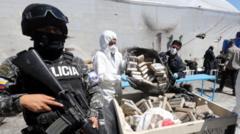Ecuador’s President Daniel Noboa is appealing for international military support in his battle against criminal gangs, suggesting that the US, European nations, and Brazil should join the fight amid soaring violence connected to drug trafficking.
Ecuador President Urges International Military Assistance to Combat Gangs

Ecuador President Urges International Military Assistance to Combat Gangs
In an interview, President Daniel Noboa calls for military aid from the US, Europe, and Brazil to tackle escalating gang violence in Ecuador.
Ecuador's President Daniel Noboa has made a bold request for military collaboration from the US, Brazil, and European countries in an effort to combat increasing gang violence in the nation. In an exclusive interview with the BBC, Noboa expressed the urgency for foreign military aid in a scenario where 70% of the world's cocaine is routed through Ecuador's ports, indicating the severity of the country’s drug trafficking crisis.
Noboa specifically appealed to US President Donald Trump to brand Ecuadorean gangs—including notable groups such as Los Lobos and Los Choneros—as "terrorist organizations," similar to actions taken against gangs in Mexico and Venezuela. The call for international military forces emerges as his government faces persistent threats from organized crime, with Noboa noting that these gangs have now evolved into "international narco-terrorist" entities with armed factions exceeding 14,000 members.
The security situation has worsened throughout Noboa's 16 months in office, provoking a notable increase in violence. Despite a reported 16% decrease in the murder rate from 2023 to 2024, January 2025 saw a record high with 781 killings in just one month. Consequently, security has become a focal issue ahead of the run-off election on April 13, with Noa promoting his administration's tough stance on criminal activities.
Alongside foreign military support, President Noboa has signaled intentions to amend the constitution to allow for the re-establishment of foreign military bases, echoing a precedent set before they were banned by former president Rafael Correa in 2009. He has assigned the foreign ministry to pursue cooperative agreements with allied nations to bolster police and military efforts against drug cartels.
In a controversial move, Noboa has partnered with Erik Prince, the founder of Blackwater, aiming to integrate unconventional warfare tactics into the country's security strategy as the president emphasizes the need for more military personnel to face armed gangs effectively. Domestic responses to Prince's involvement are mixed, with worries surrounding his controversial past linking him to previous allegations of human rights violations during combat operations overseas.
While Noboa affirms that all actions must adhere to Ecuadorean law, he highlights the extreme measures taken by these gangs, including mutilation and human trafficking, as justification for stronger military intervention. However, critics question the efficacy of his heavy-handed approach, citing recent high-profile incidents of violence involving civilians.
On the broader stage, the rising violence has prompted many Ecuadoreans to flee the country in search of safety, making them one of the largest groups attempting perilous journeys across the Darien Gap to the US. Noboa has expressed a willingness to welcome back Ecuadorean migrants, offering them support like technical training and employment incentives.
With security high on the agenda for citizens, the outcome of the upcoming election between Noboa and his left-wing rival, Luisa González, remains uncertain as both address the pressing issue of cartel violence and public safety in Ecuador. As challenges mount, President Noboa's attempts to rally international support may play a pivotal role in both ameliorating internal strife and reshaping Ecuador's role in the global drug trade.






















